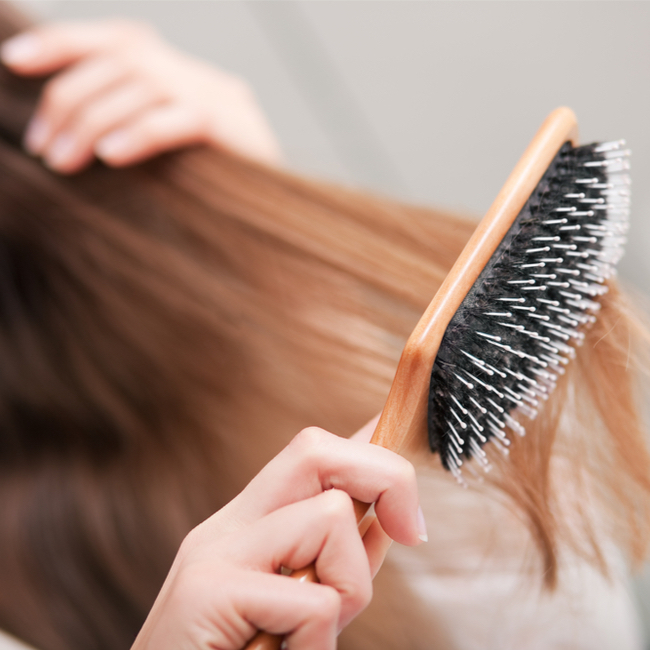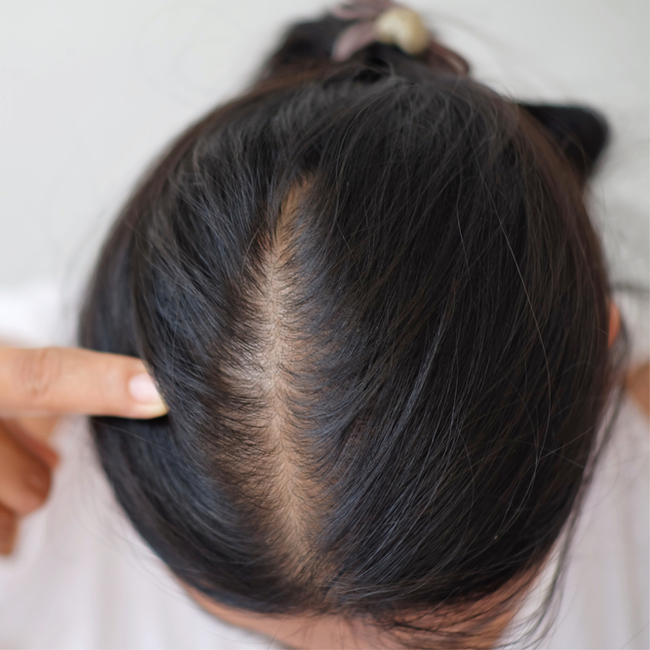
Lower Your Stress
This may be easier said than done, but stress is actually one of the most common causes of hair loss, so taking steps to lower cortisol levels may allow for a significant change in the strength of your locks. “Reduce your stress with exercise, meditation, and with the stress fighting herb ashwagandha,” suggests Burg. “Cortisol, the hormone your body produces when under stress, actively prevents hair follicles from regenerating in your scalp, which slows down and prevents regrowth.”
A solid supplement routine designed to ease stress in tandem with regular exercise will provide some of the most profound benefits in lowering cortisol and creating a healthy environment for hair growth.
Keep A Balanced Diet
Not only does your diet have a major impact on your overall health, but it can also make a mark on hair growth as well. Maintaining an eating plan that contains ample vitamins and minerals will help to naturally strengthen your strands, limiting the risk of breakage moving forward. “Make sure you have a balanced diet rich in zinc, B vitamins and vitamin D, with adequate protein and low GI carbs,” says Burg. “Your hair growth is often a reflection of your internal health. If you are not getting enough critical micronutrients and a good supply of energy and protein building blocks, then your body will preferentially use these for critical organ systems and biochemical functions at the expense of hair and nails.”
Burg also notes that zinc and vitamin D are likely the most important in healthy hair growth, so prioritizing these supplements will make all the difference in allowing your hair to grow back stronger than before.
Treat Your Hair Well
Adequately caring for your hair, despite how thin it is, is essential for promoting healthy growth in the future, so paying attention to the ingredients you’re using on your strands is paramount. “Excess fallout and thinning generally occurs when the hair cycle starts to become dysfunctional. One of the reasons why this happens is because of a build up of a protein called FGF5,” explains Burg. “FGF5 is the stop signal for your hair cycle, inducing hair fall, slowing growth and inhibiting regrowth. Stopping the negative action of FGF5 can help ensure a strong, healthy hair cycle.”
To reduce the risk of FGF5 increasing hair fallout, Burg suggests looking into scalp treatments that can block this protein from causing hair loss. “Look for topical scalp treatment products with Rosa multiflora extract, Sanguisorba officinalis extract or Swertia chirata extract to keep FGF5 under control,” he says.
Reduce Buildup
Alongside taking care of your strands, caring for your scalp will also help to ensure healthy hair growth in the future as you create a balanced environment for new hair to emerge. “As we age, or as we encounter stressors in our lives, we often experience a build up of damaging molecules such as free radicals in our bodies. These can hinder biochemical processes important for hair growth and can lead to inflammation, which itself can also damage the hair cycle,” explains Burg.
With this, adding products into your routine to improve scalp health and fight against free radical damage such as vitamin E and green tea, as well as rosemary and salicylic acid will make all the difference in your hair as it grows back. Although you cannot expect to see results overnight, within 2-3 months of your healthier hair care routine your locks should begin to grow back stronger than before with less risk of future fallout.


